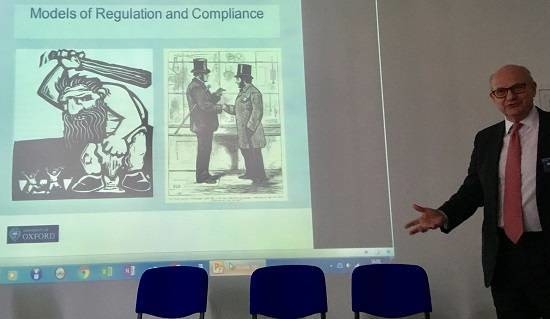#Law: Four questions for Christopher Hodges
The HEC Alumni Law & Business Club organized an April 27 seminar entitled « Legal Systems for the 21st Century » . The five-hour exchange sought to unravel some of the strengths and weaknesses of mechanisms regulating corporate behavior. Keynote speaker at the event was Christopher Hodges , Professor of Justice Systems at Wolfson College, Oxford University. He shares his thoughts on settling disputes, behavioral psychology and the concept of fairness in 21st century legal systems.

What are some of the practices you suggest to improve ethical business regulation and practices currently in place?
Christopher Hodges: There are a great number which I cite to change corporate culture. At the end of my latest book, “Ethical Business Practice and Regulation” (ed. co-authored with Ruth Steinholtz), we list pieces of evidence that companies can produce to show they are behaving ethically. They are currently being tested in different sectors of industry. For example, organizations can carry out a cultural assessment evaluation using the Barrett model. This gives a healthy assessment of a firm, to gauge where the problems lie and the actions needed to be taken.
The fundamental question here is human behavior, hence relying on the use of behavioral psychology to solve the problems. How do we know how humans behave in certain circumstances? We have to start with that, it’s fairly pointless to start off with legal and economic theories. Let’s look at the real scientific evidence found in behavioral sciences.
The concluding discussion at today’s seminar centered on legal perspectives for markets and the notion of fairness. Could you elaborate on the latter?
Evolutionary biologists tell us all normal human beings behave on the basis of emotion, gut feelings and the concepts of fairness. Unless we’re a psychopath or sociopath, we all like to feel we’re doing the right thing, and we persuade ourselves that we are, even when we’re not. So, concepts of fairness and reputation ought to be built on and put to good use, to underpin the question we all ask ourselves, both individually and in groups: ‘Are we actually doing the right thing or are we persuading ourselves we’re doing the right thing when we’re not?’
Business Schools at the Heart of New Just Culture
You gave examples from the aviation industry, talking of the “just” culture…
Absolutely. The aviation sector worldwide and its spectacular safety results are based on an open, just culture, what lawyers call a “no blame” culture. In it, everyone shares every bit of information all the time, however embarrassing. The worst social crime you can commit is to be found not to have been open when you have made a mistake. In other words, you just pass the information on. Otherwise, the system does not work and we’re not going to learn.
Quite a few multinationals are accepting this culture, but the general public is just not aware of this evolution. I feel there has been a very significant shift and is reflected in changes in business schools, over the past 20-30 years. Corporate theories mirror the shift away from maximizing shareholder value to maximizing stakeholder values, including incorporating wider values such as CSR and human rights. A lot of companies have experienced a significant shift but they are not visible or given credit for that. Take, for example, health care, hospitals or retailers. Since they are dealing with people every day they have to be seen to be fair to their customers or they’ll walk! It’s very effective.
The fairness model should be applied to everyone, including regulators, NGOs and businesses. It’s actually happening already: a number of NGOs such as Standards bodies are applying this approach now.
Unfortunately, however, some NGOs and media bodies raise questions which are provocative. I worry about this: the first question when something goes wrong is: “Who’s to blame?” Words are always used with the expectation that somebody immediately deserves blame and should go to prison, it’s a trial by media. That approach is damaging because it stops us learning. And it prevents responsible regulators and companies from acting or talking to work out what the problem is, and then fixing it. That problem could be much, much deeper when you put an effective root cause analysis in place and go beyond the immediate manifestations of the problem. And you don’t work that out through blame. The problem might simply be the symptom of something else and it needs time to sort it out… That approach prevents iterative learning through trial and error, since mistakes are not tolerate
What are you taking back to your home in Oxford from this exchange?
My message is simple: the world is changing and there are an awful lot of mechanisms that are changing with it. So, one needs to look very objectively at the scientific evidence of what mechanisms we have, and what mechanisms we should have. And then move beyond traditional theoretical thinking to look very objectively at what empirical evidence we have on how we should behave.